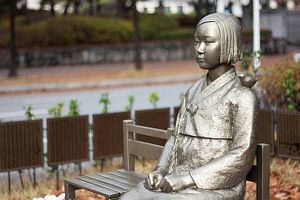In late December, Korean activists stationed a bronze statue of a young woman across from the Japanese consulate in Busan. Seated upright in a chair with her hands clasped in her lap, she stares intently, solemnly toward the consulate.
The statue offended Japan’s government so much that last week Japan recalled the Japanese ambassador in Seoul and the consul general in Busan and put major economic cooperation discussions on hold. Japanese Prime Minister Shinzo Abe himself urged the removal of the statue and called U.S. Vice President Joe Biden to complain. The statue represents a longstanding point of tension between Japan and Korea — Korean women, often referred to euphemistically as “comfort women,” who were trafficked into sexual slavery by the Japanese military during World War II. Japan and Korea concluded a historic agreement at the end of 2015 that led the two governments to declare that, if the agreement was fully implemented, it would be considered a “final and irreversible” resolution to the comfort women issue.
Japan’s government sees the statue as a taunt that violates the spirit of the agreement. But Japan’s high-level response to an action by a civic group outside of Seoul’s control makes a mountain out of a mole hill. It’s an appalling error in strategic judgment that will endanger Korea-Japan relations at a time when unity among U.S. allies is critical to deterring regional aggression. The United States must steer Japan toward a stance that reduces tensions and advances Korea-Japan relations.
Japan could have limited its response to diplomatic channels or lodged a public protest. Instead, by recalling its ambassador and cutting cooperation, it dramatically elevated the profile of the dispute and linked unrelated government cooperation to the actions of a civic group outside of Seoul. These actions stoke Korean doubts about Japan’s sincerity in addressing its wartime wrongs, and empower critics of Japan.
For perspective on the depth of anti-Japan sentiment in Korea, consider that Japan in a 2015 Pew survey received 80 percent or better approval ratings in Malaysia, the Philippines, Vietnam, and Australia but a dismal 25 percent in South Korea. The Asan Institute, a Seoul-based think tank, found that Koreans ranked Barack Obama, Xi Jinping, and Vladimir Putin far above Shinzo Abe, whose ratings in Korea from 2014-2016 tracked more closely with North Korean leader Kim Jong-un.
The relationship is especially vulnerable in Korea this year because President Park Geun-hye, the leader whose administration negotiated the comfort women agreement, has been impeached on corruption charges. Contenders are lining up for a new presidential election. Japan is an easy mark in Korean politics, and the comfort women agreement’s association with the unpopular Park makes it even more likely to become a campaign issue. Leading candidate Moon Jae-in has already called for renegotiation of the agreement.
Japan should have kept Korea-Japan relations stable to limit the issue’s potency in a turbulent election. Japan should also have actively expanded cooperation efforts that benefit Korea, demonstrating to the Korean public that good Korea-Japan relations are indispensable. Instead, Japan has empowered its critics in Korea over a statue.
The downturn in relations comes as Korea-Japan unity becomes more important than ever for deterring and punishing regional aggression. Kim Jong-un claimed in his New Year’s address that North Korea is close to testing an intercontinental ballistic missile. China continues to build military fortifications on the South China Sea outposts it has occupied, allowing it to project force across the region. Cross-strait tensions between China and Taiwan simmer. If others can divide and conquer the U.S. alliance system over a statue, we are in trouble.
Japan must let symbolic irritants lie for the broader cause of a strong Korea-Japan relationship that serves shared strategic interests. Moreover, Japanese officials should know better than to expect that a governmental agreement would quickly do away with deep-seated resentments dating back to Japan’s occupation of Korea. If Japan is serious about the relationship, Japan should demonstrate it by going above and beyond the letter of the comfort women agreement to explore additional reconciliation gestures and facilitate real reflection on Japan’s history among scholars and in textbooks. At the very least, Japan should avoid stoking tensions during a Korean electoral cycle. The Abe government should reverse course immediately and work to expand cooperation while keeping discussion of the statue in diplomatic channels.
The United States must be frank with its allies: whichever ally bears the blame in Washington for unraveling the Korea-Japan relationship will find that there will be costs for the bilateral alliance. The next U.S. ambassador to Japan should actively make the case to conservative members of Abe’s party that further historical reconciliation serves Japan’s security interests. Effective U.S. “gaiatsu” — Japanese for “outside pressure” — is critical to move Japan and Korea beyond where they would otherwise go on reconciliation and cooperation.
It was Abe’s great-uncle, Eisaku Sato, who as Japan’s prime minister in 1965 normalized relations with Korea. The negotiations had sputtered for 14 years until the most conservative factions within Japan’s Liberal Democratic Party, motivated by hardline anti-communism, concluded that a strong, stable South Korea and good Korea-Japan relations were strategic necessities in the face of Soviet and Chinese threats.
Today, too, it falls to Japan’s most conservative elements to put Japan’s long-term interests first. As Chinese aggressiveness increases, and as countries in the Asia-Pacific hedge against an unpredictable U.S. commitment, Japan has a unique opportunity to assert itself as a strategic player.
Japan has a commendable record of global contributions and a bright future. But if Japan fails to effectively handle its past, Japan will become a captive of it. That would be a shame.
Mintaro Oba is a former U.S. Department of State diplomat with responsibilities for Korea-Japan relations. He writes in a personal capacity.

































